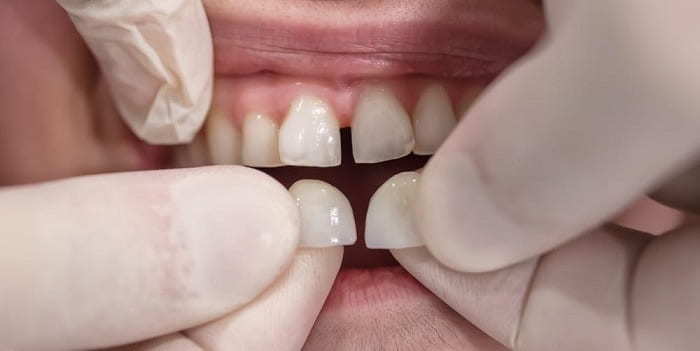
Many ponder whether dental veneers can fall off or detach. The answer is affirmative; they can indeed fall off or detach, though it’s not a common occurrence.
Once a patient undergoes examination and addresses issues like cavities, root canals, and cleanings, the dentist engages in an extensive discussion regarding dental veneers.
If both parties agree to proceed, measures are taken, and the request for veneers is sent to a laboratory for fabrication.
Subsequently, a slight shaving of the teeth is performed, and the veneers are bonded upon their return from the laboratory. The bonding process requires some time to ensure its strength and durability. When executed accurately, the risk of veneer detachment is minimal. Nevertheless, certain circumstances can weaken dental veneers and lead to their detachment.
Why Do Dental Veneers Fall Off?
Let’s delve into the reasons behind dental veneer detachment. Several factors contribute to veneers breaking, falling off, detaching, or sustaining damage.
Veneer Lifespan:
The primary reason lies in the lifespan of veneers. Porcelain veneers are expected to last at least a decade, though many claim longevity beyond that. Over time, veneers gradually detach from teeth as the bonding weakens, leading to detachment. Additionally, aging may cause bone and jaw recession, resulting in poor veneer fitment and subsequent detachment.
Poor Adhesive:
Another common cause is the use of subpar adhesive during the initial veneer bonding. Either insufficient time was allowed for proper bonding, or the technique was inadequate. In either scenario, it’s a dentist-related issue rather than a fault of the veneers themselves.
Dental Decay:
A frequent third reason is decay in the teeth where the veneers are placed. Dental decay stems from various lifestyle choices and, in some cases, the effects of prescribed medications, which individuals may not evade.
Teeth Grinding:
One of the most common reasons is patients’ habit of grinding teeth during sleep, known as bruxism, either due to physical or psychological reasons. Regular bruxism exerts significant force on veneers, making them susceptible to chipping, breaking, or damage.
Occlusal Abnormalities:
The dynamics of chewing and speaking are crucial when considering forces applied to teeth. Dentists have explored reasons for veneer detachment, with occlusal imbalances being one. Proper occlusion involves harmonious interaction between upper and lower teeth. Imbalances may result in unnecessary forces on different teeth.
This holds true for speech habits as well, as teeth are used in speech articulation. If pre-existing minor threats such as bruxism, gum disease, or dental decay exist, they should be examined and managed as part of the comprehensive treatment plan.
Sticky Foods:
Indulging in sticky candies and sugary treats can weaken the bond between the veneer and the natural tooth.
Prevention and Treatment of Dental Veneer Falls
In general, when your dental veneers fall off, break, or sustain any damage, DO NOT attempt to reattach them yourself. Attempting self-repairs will likely worsen the situation. Instead, carefully place them in a small container and contact your dentist for an emergency appointment.
Regular Check-ups:
The best way to maintain your veneers is through routine visits to the dental office. Dentists can inspect your Emax or veneers for any signs of wear or damage. If a veneer falls off, keep it and bring it along for potential reattachment to the front teeth. If you lose a veneer, a new one will need to be fabricated, which may take some time before completion. Expect many years of good wear with your new dental veneers.
Veneer Repairs:
If you’ve worn dental veneers for over a decade, wear and tear may have dislodged, detached, or broken them. In such cases, carefully store the fallen or damaged veneers in a small box wrapped in soft material and attempt to schedule an appointment with your dentist as soon as possible.
The dentist will assess the dental veneer’s condition and determine whether it can be reattached or if new veneers are necessary.
Depending on its state, the dentist may temporarily reattach it delicately to observe its stability. If it holds, the dentist will clean the veneers of their previous adhesive and inspect the inner surface. Subsequently, the inner surface will be chemically treated, and new bonding will be applied. Such repairs can extend the veneers’ lifespan for several more years.
Rebonding:
If your dentist initially used improper bonding agents to affix the veneers to your teeth, resulting in detachment, seeking another dentist’s opinion is advisable. Once the damaged dental veneer is brought to the dentist’s office, and they confirm the veneers are sound and the issue lies in bonding them to the teeth, it’s time to seek a second opinion.
Lifestyle Adjustment:
When teeth are decayed, adhesive detaches, and veneers fall off. It’s crucial to modify your lifestyle to cease or mitigate dental decay. Dental decay not only harms veneers but also impacts your overall health. If, on the other hand, you’re taking medications accelerating dental decay, consult your physician regarding the medication’s side effects and perhaps request your dentist to discuss the issue with your specialist.
In some cases, such as with patients with a history of bulimia, the enamel coating on the sides of teeth has eroded, exposing dentin.
This dentin doesn’t adhere well to veneers, and bonding to dentin eventually fails. Veneers should not have been applied to such teeth in the first place. However, it would be a mistake to reattach veneers to the same teeth. Opting for porcelain crowns is the best choice in such scenarios, as they’ll safeguard the back of your teeth where enamel has been completely removed and dentin is exposed.

